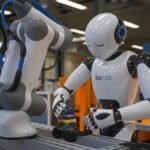.General Artificial Intelligence (GAI), or Artificial General Intelligence (AGI) is a concept that fascinates as much as it intrigues. Unlike the specialized artificial intelligence we use today - capable of performing well-defined tasks such as speech recognition or content recommendation - AGI aims to endow machines with intelligence similar to that of humans. This means that a general AI would be capable of to understand, learn and adaptand of think on any cognitive task, without the need for retraining or reprogramming.
This type of AI could, for example, go from a task as diverse as playing chess to diagnosing diseases, all with the same flexibility as the human mind. While AGI is still largely theoretical, there are technological advances that are gradually bringing this vision closer to reality. However, a number of challenges still need to be overcome to make AGI truly functional and applicable in a variety of sectors.
Differences between Specialized AI and IAG
The AIs we use today, however powerful they may be, are considered to be Narrow AIs (or Specialized AIs). They are programmed to solve specific problems, such as medical image analysis, autonomous driving or recommendation systems. As things stand, they cannot transfer their skills from one field to another.
On the other hand, a GAI would be able to switch from one domain to another without needing to be reprogrammed. For example, if an AI specialized in medical image analysis were also an AGI, it could learn playing music or devising business strategies after limited exposure to these new fields.
Some fundamental differences:
- AI Specific Designed to accomplish a specific task (image recognition, NLP, recommendation).
- GAI Able to carry out several complex and varied tasks, without specialization.
This versatility is what makes the IAG so promising and, at the same time, so difficult to achieve.
AGI
Although AGI remains a distant goal, emerging technologies and approaches are paving the way for its realization.
1. Deep Learning and Neural Networks
Visit deep learning is today one of the most advanced AI technologies. Thanks to deep neural networks, systems can learn from large quantities of data and perform complex tasks such as image recognition, language comprehension or predictive analysis. However, these systems remain specialized in the tasks for which they are trained.
To reach GAI, these neural networks must become more flexible, capable of generalize their learning to different domains, and adapt to new tasks without requiring new data or training.
2. Generative Artificial Intelligence (Generative AI)
.Generative AIlike the one used in ChatGPT or DALL-Eis capable of creating text, images or sounds according to instructions given by the user. These models are based on massive data sets and generate responses based on these learnings.
Generative AI models show advances towards more flexible intelligence, but they are still limited to specific tasks. A true GAI would be able to produce content independently in any field and apply the knowledge acquired from one task to another.
3. Natural Language Processing (NLP)
Visit natural language processing (or NLP) is the technology that enables AIs to understand, analyze and produce human language. Applications such as Amazon Lex and Google DialogueFlow already enable companies to create advanced dialogue systems to interact with users in real time.
However, today's NLP systems are often domain-specific. A GAI would master natural language more generally, enabling it to understand and interact in any context, without further training.
4. Supercomputers and Computing Power
The IAG will require colossal computing resources to process large quantities of data in real time and run several tasks in parallel. Advances in supercomputers and in graphics processing units (GPUs)like those developed by Nvidia and AMDare key elements in the IAG quest. These supercomputers enable more powerful AI models to be trained, capable of generalize their skills.
IAG Challenges
While IAG's promise is tempting, there are several major obstacles in the way.
1. Knowledge transfer
The greatest challenge facing IAG is the ability to generalize knowledge. At present AI are very good at what they've been trained to do, but fail to transfer these skills to new contexts. A true RMI must be able to adapt to any situation, using past learning to solve new problems without human intervention.
2. Creativity and Emotional Intelligence
Another major challenge is the creativity and theemotional intelligence. While some generative AIs can write poems or create artistic images, they do not yet have the capacity to grasp concepts such as empathy, motivation or human originality. The IAG will need to demonstrate understanding human emotions and be able to think and create in an authentic way.
3. Ethics and Safety
IAG also poses ethical issues and safety. A general intelligence capable of learning, adapting and making decisions autonomously could potentially become uncontrollable. AI experts agree on the need to create guardrails to avoid possible abuses and ensure that these systems act in the interests of humanity.
IAG's potential impact on businesses
If the IAG becomes a reality, it could revolutionize in many sectors and offer considerable benefits to companies.
1. Intelligent Process Automation
IAG could automate complex, repetitive processes, going far beyond traditional automation. It could adapt to changes in real time, optimize operations, and offer innovative solutions without human supervision.
2. Autonomous Decision Making
IAG systems could analyze millions of data sets in real time and make autonomous decisions in areas such as finance, marketing and logistics. This would enable companies to react more quickly to market changes and adapt with greater flexibility. enhanced precision.
3. Advanced Customization
In sectors such as retail or customer service, the IAG would enable us to customize experiences to an unprecedented level. By analyzing customer behavior, an IAG could anticipate their needs and proactively propose appropriate solutions.
4. Innovation in Research and Development
IAG could also accelerate scientific discoveries and technological innovations. In the medical field, it could analyze billions of pieces of biological data to discover new treatments or prevent epidemics.
How Axis Intelligence supports companies in adopting AGI
At Axis IntelligenceWe're at the cutting edge of artificial intelligence innovation. We help companies to integrate AI solutions to improve productivity, automate processes and optimize decision-making. Our experts keep a close eye on advances in EMI, and work to anticipate the needs of companies to help them prepare for future transformations.
General Artificial Intelligence and Sector Transformation
1. Health Sector
The IAG could revolutionize the healthcare sector by making it possible to faster analysis of medical dataWe're also able to automate complex tasks such as the design of new drugs. Thanks to its ability to reason and its ability to learn new fields, an IAG in the medical sector could :
- Analyze voluminous medical records to detect patterns that escape the human eye.
- Submit personalized treatments based on each patient's medical history.
- Prevent epidemics by cross-referencing data from several sources and establishing rapid correlations.
An IAG system could also play a key role in the surgical roboticswhich enables surgical robots to perform complex tasks autonomously or semi-autonomously.
2. Manufacturing industry
In the manufacturing industry, AGI could automate the processes of product designof supply chain managementandproduction optimization. Unlike current AI systems, which are often limited to very specific environments, an IAG could adapt to unforeseen changes, adjust the production strategies in real time, and minimize interruptions due to technical problems or human error.
3. Education
AGI could also revolutionize education. Imagine systems capable of personalizing learning for each student, adapting to their pace and difficulties, and offering tailor-made solutions to improve their understanding of complex subjects. Teachers could also benefit from AGI to better manage their classrooms, by automating certain administrative tasks and focusing on pedagogy.
4. Cybersecurity
Cybersecurity is another area where IAG could have a major impact. Today's AI systems can detect anomalies in networks or identify potential threatsBut they are limited by the data they are trained with. An AGI could not only anticipate cyber attacks based on past behaviour, but also react autonomously to new threats without having been programmed for each particular scenario.
Technical and ethical challenges related to AGI
1. Sensory Perception and Physical Interaction
For AGI to become truly effective, it will need to be able to interact with the physical world as fluidly as humans. This includes the ability to collect and understand its environment through visual sensors, hearingand haptics (touches). This remains a major challenge, as the technologies of computer vision and sensory signal processing are still far from reproducing human perception in all its complexity.
2. IAG Ethics
One of the major concerns surrounding IAG concerns ethical issues. If an AI becomes intelligent enough to surpass human capabilities in certain areas, who should control this AI? How can we make sure it stays kind and aligned with human interests? These questions require careful thought and safeguards, because a misused AGI could do more harm than good.
Organizations such as OpenAI are already working on these issues and on the development of so-called Aligned AIsThese are systems that follow predefined ethical principles and act in the best interests of society.
3. Regulating advanced AI
IAG regulation will also be crucial in preventing abuse. Governments and international organizations will have to put in place standards and regulations for the development and use of these systems. Issues such as data protectionthe legal liability and the transparency will be at the heart of the discussions.
Potential applications of IAG for the future
1. Business Process Automation
In a future where RMI is commonplace, companies could take advantage of systems capable of automating specific tasks. whole processes. This could include supply chain management predictive maintenance machines, or even stand-alone marketing campaigns capable of adapting to consumer responses in real time.
2. Innovation in Products and Services
IAG systems could also be used to design innovative productsby analyzing market data, consumer trends and technological advances to come up with solutions that even human teams wouldn't have considered. Companies that adopt IAG could gain a significant competitive advantage by offering products faster and more efficiently.
How Axis Intelligence supports IAG integration
At Axis IntelligenceWe understand the importance of staying at the forefront of technological innovation. We help our customers to implement artificial intelligence solutions which not only improve their operational efficiency, but also prepare them for a future in which IAG will play a central role in all sectors.
We offer services such as :
- Intelligent automation We implement systems that optimize business processes and reduce operating costs.
- Data-driven decision-making Our solutions help companies harness AI to make real-time decisions based on accurate data.
- Technological anticipation : We monitor AI trends and support companies in adopting emerging technologies, including AI.
FAQ - General Artificial Intelligence
1. What is General Artificial Intelligence?
.General Artificial Intelligence (GAI) is an advanced form of AI capable of performing a variety of human tasks without the need for task-specific programming. It differs from current AI, which is specialized for specific applications.
2. What are the main differences between AGI and specific AI?
IAG is capable of transferring knowledge between different fields, while AI is designed to perform a single task or a series of very specific tasks.
3. What are the challenges facing the development of the IAG?
Challenges include the generalization of knowledge, creativity and emotional intelligence, as well as ethical and regulatory issues.
4. How can IAG transform companies?
IAG could revolutionize businesses by automating complex processes, making autonomous decisions and offering customized solutions in real time.
5. When can we expect the IAG to become a reality?
Although technologies are evolving rapidly, AGI is still a future goal. Many researchers believe we could see significant progress in the coming decades, but it is not expected in the immediate future.





